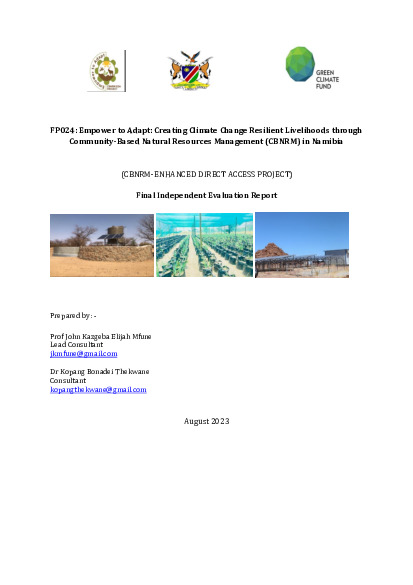Final independent evaluation report for FP024: Enpower to Adapt: Creating Climate-Change Resilient Livelihoods through Community-Based Natural Resource Management (CBNRM) in Namibia

Final independent evaluation report for FP024: Enpower to Adapt: Creating Climate-Change Resilient Livelihoods through Community-Based Natural Resource Management (CBNRM) in Namibia
The Monitoring and Accountability Framework (MAF) requires Accredited Entities to submit an interim evaluation and a final evaluation, collective known as AE-led evaluation, for each funded activity. While Interim Evaluations are performed midway through the implementation of an intervention to assess progress towards and likelihood of achievement of outcomes and impacts, Final Evaluations are conducted at the end of an intervention to provide evaluative evidence covering the entire intervention. It measures the overall impact, effectiveness, efficiency, sustainability, replicability and lessons learnt of a project (page 17 - 18, GCF Evaluation Policy).
The evaluations ensure that the Fund is able to inform its overall results, successes and unintended consequences in a credible and measurable manner. As an accountability tool, AE-led evaluations allow Accredited Entities to comply with the reporting requirements of the GCF and demonstrate the effectiveness of a funded activity. As a mechanism for learning and adaptive management, these evaluations inform decisions to improve project/programme implementation and/or future programming directions. The GCF Evaluation Policy expounds on this MAF requirement and provides the overarching framework to AE-led evaluations including the evaluation principles and criteria and roles and responsibilities.
Thus, the objective of final evaluations is to create a body of evidence that informs decision-making, investments and, more broadly, enable the GCF to understand the causes of results and/or the credibility of results reported. It is also to help determine the contribution of the GCF to the achieved transformation.